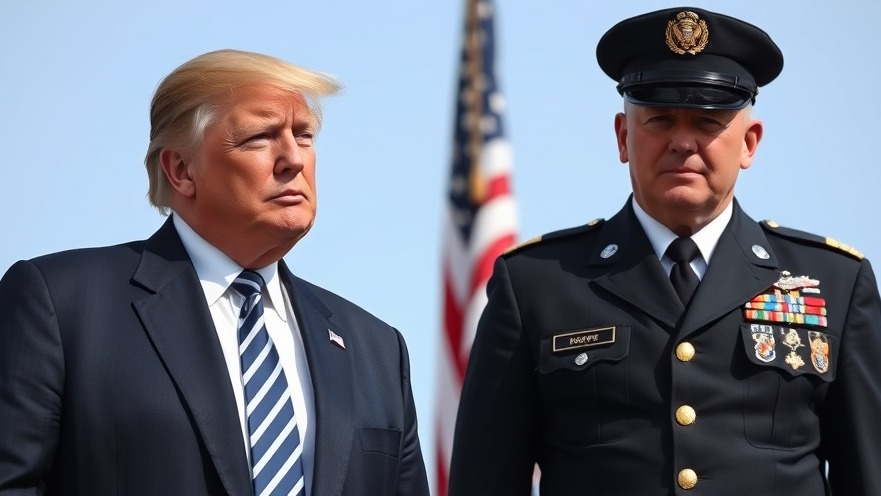
Unpacking Trump's Controversial Comments on Military Withdrawals
In a recent Cabinet meeting, former President Donald Trump did not hold back as he expressed his frustration towards former Chairman of the Joint Chiefs of Staff, Gen. Mark Milley. Trump labeled Milley an 'idiot' for his decision to leave military equipment in Afghanistan during the chaotic troop withdrawal in 2021. This confrontation highlights the ongoing fallout from the U.S. exit from Afghanistan—a situation that has been fraught with controversy and criticism.
Understanding the Military Equipment Left Behind
According to a report from the Department of Defense, the U.S. left behind an estimated $7 billion worth of military gear as troops evacuated. While most significant equipment was either removed or destroyed, various aircraft, ground vehicles, and weaponry were abandoned. This equipment is now in the hands of the Taliban, raising questions about the implications of this military retreat. Trump emphasized that the decision to leave the equipment was not only unwise but also embarrassing for the nation, claiming it reflected poorly on U.S. dignity and credibility.
The Political Landscape: Who’s to Blame?
The withdrawal from Afghanistan was a contentious issue that began under the Trump administration and continued into President Biden's tenure. While Biden faced intense scrutiny over the disorganized exit, Trump’s criticism of Milley adds another layer to this political saga. The debate around the military equipment becomes a flashpoint for those analyzing accountability and decision-making in military leadership. With significant loss of life during the withdrawal—including the tragic deaths of 13 U.S. service members—questions of responsibility are at the forefront.
A Broader Look at Military Leadership Accountability
Trump's remarks come as Secretary of Defense Pete Hegseth announced a comprehensive review of the Afghanistan withdrawal aimed at holding parties accountable. This could shed light not only on leadership decisions but on the planning and execution processes regarding the withdrawal. The challenge remains: how do nations learn from previous military entanglements? As citizens, understanding these dynamics is crucial.
Lessons in Leadership and Military Decisions
The clash between Trump and Milley over the decision to leave equipment in Afghanistan serves as a reflection of the broader discourse on leadership accountability within military ranks. It raises critical questions about the implications of military decisions made in high-pressure situations. What methodologies can be derived from this incident? Future military and political leaders must consider both immediate operational needs and long-term geopolitical implications when making such decisions.
Moving Forward: The Future of U.S. Military Engagement
As the U.S. and its allies grapple with the ramifications of the Afghanistan debacle, it is evident that future military engagements may be approached differently. Lessons from Afghanistan will inevitably influence how military strategies are crafted and executed, particularly concerning troop withdrawals. Political and military leadership must collaborate closely to develop frameworks that prioritize not only operational efficiency but also ethical considerations regarding soldiers and local populations.
Call to Action: Engage with Military Accountability Discussions
This ongoing conversation about military accountability is pivotal not only for policymakers but for citizens who wish to ensure that such missteps are not repeated. We encourage you to engage in discussions, educate yourself, and advocate for transparent military policies that ensure the safety and accountability of U.S. forces.
Conclusion
Reflecting on Trump's comments and the aftermath of the Afghanistan withdrawal, it's clear that the decisions made during military operations carry lasting weight. Understanding the context and implications not only informs our perspective on current affairs but shapes how we envision the future of military engagement. Striking a balance between leadership decision-making and ethical military practices is essential as the nation moves forward from this chapter in its history.
 Add Element
Add Element  Add Row
Add Row 



Write A Comment